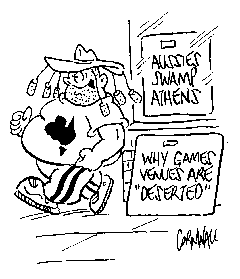Spectators are important to the Olympics. They are more than the backdrop to a global event; they provide the tangible buzz of excitement that is conveyed to the huge television audience.
Although there was a full house for the much-praised opening ceremony in Athens on Friday night, spectators have stayed away in droves in the first four days of competition. There have been reasonable crowds at some of the glamour events, such as gymnastics, swimming and diving, but many other attractive and well-appointed venues have been virtually empty.
These revealing TV images are backed up by the figures on ticket sales. Although there is some debate about how many tickets have been sold - figures vary from 2.9 million to 3.3. million - it is well short of the available 5.3 million tickets. These figures reverse the trends of previous Games. The 1996 Atlanta Olympics set a record with 8.3 million tickets sold.
Advertisement
Although Sydney had less spectator capacity and a smaller aggregate of 6.7 million spectators, it set a benchmark for the proportion of tickets sold - more than 90 per cent. This was an impressive take-up figure because it occurred across the board. It included preliminaries and finals, popular and minor sports.
The absent spectators are a matter of great concern to the International Olympic Committee and to the Athens organisers. There have been media reports of proposals to rent a crowd, to give away free tickets to the public and the volunteers.
Various theories have been advanced to explain the no-show Olympics. One is that the events started on a holiday weekend and another is that there is limited interest in the preliminary stages. But the most popular theory is that the Athens Olympics, being the first Summer Games since September 11, are a casualty of increased security fears.
There may be some truth in this view. Since 9/11, after all, there has been an increased fear of terrorism. It has been reported that fewer Americans have taken up Olympic packages than was the case in 2000. It is likely as well that there are fewer European visitors.
However, international tourists represent only a small proportion of the Olympic crowd. It was reported that there were 111,000 Olympic tourists at the Sydney Olympics. If each tourist attended ten events, they made up less than one-sixth of the spectator figure. The vast majority of spectators were from the host city, state and country. And it's true that other post-2001 mega-sporting events the 2002 Soccer World Cup in Japan and South Korea and the 2003 Rugby World Cup in Australia drew bumper crowds for preliminary matches as well as the finals.
It's hard to avoid the conclusion that the Greeks are not supporting their own Games. Such a claim will puzzle Australians, who readily embrace a global sporting event of any kind. Who can forget the 20,000-plus crowds at the non-rugby city of Launceston to watch an inconsequential match (in terms of qualification prospects) between two rugby minnows, Namibia and Romania?
Advertisement
It is ironic that although Greece is the home of the Olympics, it does not have a strong culture of Olympic sport in more contemporary times. While some Olympic sports are popular - such as football, track and field, wrestling, tae kwon do and diving - others, such as field hockey, are hardly known in Greece.
Greece's performances in the modern Olympics have also been relatively modest. Since 1948, Greece has only won 12 gold, 13 silver and 9 bronze medals - a total of 34. This is little more than half of what Australia achieved in the 2000 Games alone. Greece failed to win a gold medal in 8 of the 13 Summer Games between 1948 and 2000. (It's doubtful whether the fortuitous gold medal in men's synchronised diving changes this pattern.)
The interest of host country spectators is always whetted by anticipated Olympic success. Australians flocked to the pool to witness an expected gold rush and Stadium Australia was filled to capacity when Cathy Freeman won her historic gold medal. The Greek crowds have much fewer gold medal prospects and the possible absence of two star sprinters has reduced opportunities to celebrate the success of their own athletes. Greece's relatively small population - about half the size of Australia's - is another problem.
Maybe the months and months of international criticism, the seeming disorganisation and the anticipated chaos of the Games have taken their toll on the Greek public, even though the organisers achieved a remarkable turnaround in the last months. Sydney, remember, had its share of controversies in the lead-up period. But with the arrival of the torch, four months before the Games, the Olympic mood in the host country became positive, even euphoric.
So will the absence of spectators affect the assessment of the Games? Sadly, it will, if it persists. Empty stadiums convey a sense of a lack of public interest in the competition, which diminishes the Games for athletes as well as viewers. Some may conclude, perhaps unfairly, that the organisers have not been successful in persuading their public to fully embrace Greece's moment in the international spotlight.
